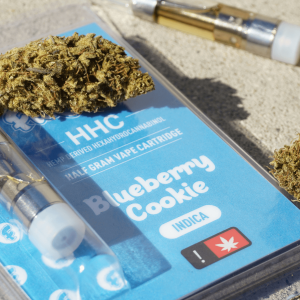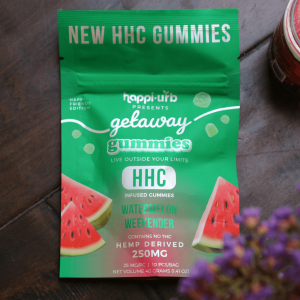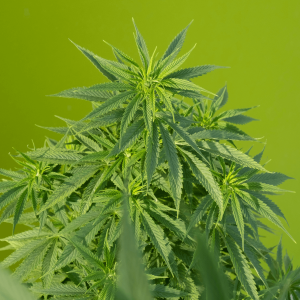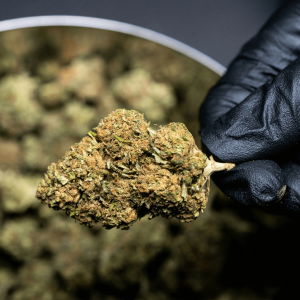Maybe you consider yourself well-versed in cannabinoid education, or maybe you’re still scratching your head “What is HHC?” Either way, you’re in the right place.
HHC is a new player in the roster of hemp-derived cannabinoids making waves in the wellness scene. Hexahydrocannabinol, or HHC, is quickly gaining attention among those curious about its unique properties and effects. Understanding HHC is important as it helps us appreciate its potential benefits and how it differs from other cannabinoids like THC and CBD.
This guide will walk you through the basics of HHC, why it’s becoming popular, and what you need to know before diving in. We’ll touch on how it’s made, its potential uses, and some key things to watch out for. Whether you’re new to cannabinoids or just wanting to expand your knowledge, this blog aims to keep things simple and straightforward. Let’s get started!
What Does HHC Stand For?
HHC stands for Hexahydrocannabinol, which might sound like a mouthful, but let’s break it down into something a bit easier to digest.
In the world of chemistry, HHC is known as a hydrogenated hydrocarbon. This essentially means that it is a compound derived by adding hydrogen atoms to another substance—in this case, a cannabinoid. Think of it like the hydrogenation process used in food to transform oils into margarine, making them more stable.
The basic idea behind HHC in cannabis is similar—it’s a cannabinoid that has been hydrogenated. This process impacts the molecular structure, potentially offering longer shelf life and stability for the compound.
While it’s part of the cannabis family, HHC stands out because it presents distinct inte
ractions within the body and cannabinoid receptors, differing from its more well-known relatives like THC and CBD. As we dive deeper, we’ll see how these unique qualities might make HHC a cannabis derivative worth considering.

What is HHC: The Origin of HHC
Hexahydrocannabinol (HHC) might seem like the newest trend in the cannabinoid universe, but its origins trace back further than you might expect. HHC was initially discovered in 1947 by the American chemist Roger Adams. During his exploration of cannabinoids, Adams added hydrogen molecules to delta-9 THC, a process known as hydrogenation. This experimentation laid the foundation for what we now recognize as HHC.
However, despite its discovery mid-20th century, HHC remained relatively obscure until recent years. It wasn’t until advances in cannabis extraction and synthesis technology that HHC resurfaced, capturing the attention of both enthusiasts and researchers interested in its stability and potential therapeutic applications.
Chemical Structure of HHC
The chemical structure of HHC sets it apart from its cannabinoid cousins. At its core, HHC is a hydrogenated version of THC, which means that additional hydrogen atoms have been added to its molecular structure, resulting in a more stable compound. This hydrogenation process not only increases its shelf life but also reduces its oxidation, making it potentially more resilient to environmental factors.
Compared to THC and CBD, HHC possesses a slightly altered 3D structure that can influence how it interacts with the body’s cannabinoid receptors within the endocannabinoid system. While THC and HHC share the basic cannabinoid framework, the additional hydrogens in HHC’s structure may change the way it binds with cannabinoid receptors, offering distinct effects and benefits.
Understanding these molecular differences is key to appreciating the unique position HHC holds among cannabinoids and hemp-derived products.
How HHC is Produced
Hydrogenation Process
Creating HHC involves a fascinating process called hydrogenation, which is a bit like cooking up your favorite recipe but with some chemistry involved. It all starts with extracting delta-9 THC from the high potency cannabis sativa plant.
In the lab, this THC extract is mixed with hydrogen gas in the presence of a catalyst—usually a metal such as palladium, nickel, or platinum. The catalyst’s role is pivotal here, as it helps the hydrogen molecules attach themselves to the THC. Picture it as a matchmaker helping two elements come together!
Once the hydrogen has bonded with the THC, the mixture is left to simmer for a while, a period known as the reaction time. This is where magic happens: the THC is transformed into HHC. By adding hydrogen, the chemical structure of THC is altered, making it more stable and resistant to oxidation. This stability is part of what makes HHC potentially longer-lasting and more resilient than its non-hydrogenated counterparts like THC.
Industrial and Lab Production Methods
HHC production isn’t limited to high-tech laboratories these days. As the demand for this unique cannabinoid grows, more producers are turning to industrial methods similar to those used in large-scale food hydrogenation processes. In these settings, precision and safety are key. Strict controls are maintained to ensure the correct balance between THC and hydrogen gas, and to make sure the catalyst is evenly distributed throughout the mixture.
In lab settings, the process is typically conducted on a smaller scale, allowing for more experimental approaches and controlled testing environments. Researchers work to optimize factors such as temperature, pressure, and reaction time to yield the purest HHC possible.
Both industrial and laboratory productions strive to refine the efficiency, safety, and environmental impact of the hydrogenation process, paving the way for HHC to become a mainstay in the cannabinoid marketplace.

Potential Benefits of HHC
When it comes to the potential benefits of HHC, much of the excitement is fueled by anecdotal reports. Some users have shared experiences such as:
- Enhanced relaxation without the heavy sedation sometimes linked to THC.
- A noticeable feeling of euphoria and mood uplift.
- Less anxiety compared to some reactions reported with THC use.
- Extended effects, making it a favored choice for those seeking prolonged relief.
Onset Time, Potency, and Strength
Describing the onset time and potency of HHC is a bit like figuring out the perfect cup of coffee that gets you going: it varies for everyone. However, users suggest that the onset time for HHC can be quite rapid, comparable to THC.
The potency is often felt as being somewhere in between THC and CBD—giving a stronger effect than CBD but not as intense as THC—for many users. This moderate strength is appealing for those looking to enjoy a mellow high without feeling overwhelmed.
Comparison with Other Cannabinoids Like THC and CBD
In the grand scheme of cannabinoids, HHC seems to bridge a gap between THC and CBD. While THC is known for its potent psychoactive effects, and CBD is often praised for its non-psychoactive therapeutic benefits, HHC offers a blend of both worlds. It provides a mild psychoactive substance experience, allowing some to enjoy recreational-like effects with reportedly less intensity and fewer side effects.
This makes HHC an attractive option for those who might find THC too intense but still desire more noticeable effects than what CBD typically delivers. The potential ease of use and balance between relaxation and euphoria make it a unique player in the cannabinoid arena.
Legal Status of HHC
The legal status of HHC is still developing and remains quite a patchwork globally. In some parts of the world, HHC is currently legal due to its classification as a novel compound that hasn’t yet been specifically regulated.
However, it’s important to note that HHC’s legality can be quite fluid, and its status is subject to change as lawmakers and regulatory bodies catch up with the fast-moving cannabinoid market. For instance, in the United States, HHC is often sold in states where cannabis is legal and falls into a legal gray area in those with restrictive cannabis laws.
Some countries may soon evaluate HHC under existing frameworks of synthetic cannabinoids or enact specific legislation to address its growing presence in the market. This uncertainty presents challenges for producers and consumers alike, who must regularly stay informed about the shifting legal landscape.
On the horizon, the future outlook for HHC’s legal status will likely hinge on further cannabinoid research into its effects and potential benefits, as well as public and governmental perceptions of its safety.
Policymakers may also consider how HHC’s profile compares to more established cannabinoids like THC and CBD, potentially leading to regulatory action that mirrors these substances. Advocacy for clarity and standardized global regulations could facilitate HHC’s integration into more mainstream wellness and recreational markets.
HHC in the Market
As awareness of HHC increases, its presence in the market is gaining traction, with a variety of products now available to consumers. Common HHC products include:
- Edibles
- Tinctures
- Vape cartridges
These products appeal to those seeking an experience similar to cannabis but with purportedly less pronounced psychoactive effects. Additionally, the rise of HHC is supported by marketing that positions it between THC and CBD, drawing in users looking for a middle ground. The current trend shows an accelerating interest in HHC, particularly as novelty and curiosity drive initial consumer exploration.
Market growth for HHC is supported by a broader acceptance of cannabinoids and expanding legalization trends globally. With continued research and an expanding array of products, HHC could potentially carve out a significant niche within the cannabinoid market. Businesses looking to capitalize on this trend must navigate the evolving legal landscape while staying attuned to consumer demand and preferences.
Overall, the popularity of HHC is expected to grow as more people become aware of its unique attributes and potential advantages over other cannabinoids.

Consumer Experience with HHC
Common Uses and Applications
When it comes to experiencing HHC, consumers have a lot to share about its versatility and appeal. This cannabinoid is finding its way into daily routines, offering a range of applications that cater to both recreational users and those seeking wellness benefits.
Whether it’s incorporating HHC into a nightly routine to wind down or using it during the day for that gentle uplifting effect, the ways in which people are integrating HHC into their lives continue to expand. Let’s dive into some of the most common uses and applications of HHC, as shared by its growing community of users.
- Stress Relief: Many consumers turn to HHC for its relaxing properties, seeking to unwind after a busy day or to ease anxiety without the heavy sedative effects often associated with THC.
- Mood Enhancement: Users frequently report experiencing a gentle euphoria and improved mood, with HHC offering a more subtle uplift than traditional THC products.
- Pain Management: HHC is sometimes used for its potential analgesic properties, providing relief from chronic pain or discomfort with less psychoactive intensity.
- Sleep Aid: Some individuals use HHC to help with sleep, appreciating its calming effects that can encourage a restful night without feeling overly sedated.
Reported Effects and Consumer Feedback
Consumers often describe HHC as offering a balanced experience, blending relaxation and euphoria without the overwhelming high that can accompany higher doses of THC. This makes it a popular choice among individuals who desire moderate psychoactive effects, or who have found THC too intense.
Users appreciate the lighter feel of HHC, which allows for clearer thinking and a more functional state while still enjoying a pleasant mood boost. Overall, feedback suggests that HHC nicely fills a niche between the strong psychoactivity of THC and the subtler effects of CBD.
Safety Concerns and Regulations
Navigating the safety concerns and regulatory landscape of HHC can seem a bit daunting at first, but it’s essential for both producers and consumers to stay informed.
With the compound’s growing market presence, understanding potential safety issues and how they are being addressed by regulations is more important than ever. In this section, we’ll explore common safety questions associated with HHC and take a closer look at the regulatory measures shaping its future.
Potential Side Effects
- Mild Discomfort: Some users have reported experiencing temporary discomforts such as dry mouth or mild headaches after using HHC.
- Altered Perception: Although less intense than THC, HHC can still alter perception, and users are advised to be cautious with activities requiring full attention, such as driving.
- Variable Potency: As the potency can vary between different HHC products, users might experience inconsistent effects, highlighting the importance of proper dosing.
Regulatory Considerations and Pending Research
The regulation of HHC remains in a state of flux, with its legal status not yet well-defined in many areas. The cannabinoid market’s rapid evolution means lawmakers are working to keep up and may soon implement more explicit guidelines regarding the sale and use of HHC.
Currently, the lack of comprehensive scientific research on HHC calls for more studies to establish its safety profile, standardize dosages, and better understand its long-term effects. As research progresses, this could lead to clearer regulatory frameworks, helping consumers and industry players navigate this emerging market more confidently.

The Future of HHC
As the interest in HHC continues to rise, emerging studies are paving the way for a deeper understanding of this intriguing cannabinoid. Researchers are beginning to explore a wide range of areas—such as its long-term effects, potential therapeutic applications, and safety profile—seeking to unlock its full potential. These studies could not only confirm the existing anecdotal benefits, like stress relief and mood enhancement, but also reveal new uses that have yet to be discovered.
The future of HHC in the consumer market looks promising. Predictions suggest that as research progresses, HHC could become a staple in the cannabinoid industry, appealing to a broader audience desiring a middle ground between the potent psychoactive effects of THC and the milder influence of CBD.
Plus, expanding legalization and clearer regulatory frameworks will likely drive both industry growth and consumer confidence. We can anticipate that HHC will diversify in its applications, with innovative product developments emerging to meet the evolving preferences of its users.
As understanding deepens and the product lineup expands, HHC has the potential to carve out a unique and enduring niche within the bustling cannabinoid market.
What is HHC: Conclusion
As we wrap up our exploration of HHC and its connection to cannabinod receptors, it’s clear this cannabis plant cannabinoid holds a unique spot in the ever-evolving light cannabis market. We’ve looked at how HHC is being embraced by consumers for its stress-relief and mood-enhancing attributes while presenting a milder alternative to THC’s often intense effects.
Users have found it to be a versatile addition to their routines, whether seeking a gentle uplift or relief from discomfort. Despite these benefits, there’s an ongoing need for more research to provide clearer insights into its long-term safety and efficacy. The regulatory landscape is also crucial, with pending guidelines set to shape how HHC will fit into the market.
Going forward, HHC’s blend of relaxation and mellow psychoactivity, coupled with developing research and regulations, suggests a promising future. It stands poised to carve out an essential niche, offering consumers a balanced experience that bridges the gap between THC and CBD, making it a potential staple in the growing cannabinoid industry.

Frequently Asked Questions
1. What is HHC?
HHC, or Hexahydrocannabinol, is a cannabinoid derived from hemp, known for offering a milder alternative to the traditional THC high. It exists naturally in the cannabis plant in small amounts and can also be synthesized in laboratories.
HHC is gaining popularity for its ability to produce a gentle euphoria and mood enhancement without some of the more intense psychoactive effects that come with THC consumption. Although it’s still relatively new to the market, HHC is being explored for its potential applications in wellness products, providing users with a balanced experience that falls between the more well-known cannabinoids like THC and CBD.
With ongoing research and shifting legal landscapes, HHC is carving out its place in the cannabinoid world, providing an approachable option for those seeking a subtle uplift.
2. Does HHC get you very high?
HHC is known for producing a milder high compared to traditional THC products. While it can still offer feelings of euphoria and relaxation, the effects are generally considered to be more subtle. This makes HHC an attractive option for those who are looking for a gentle lift without the intense psychoactive effects that THC can sometimes provide. As with any cannabinoid product, individual experiences can vary based on tolerance, dosage, and personal chemistry.
3. What does HHC do to me?
When you consume HHC, you may experience a range of effects that blend relaxation with a pleasant mood boost. Some users report feeling more clear-headed and functional compared to the traditional “high” associated with THC. These effects can vary, offering a sense of calm while possibly enhancing creativity or focus. It’s important to start with a low dose to understand how HHC affects you personally, as each individual’s response can be different.
4. Is HHC stronger than CBD?
HHC and CBD interact differently with the body’s endocannabinoid system. While CBD is non-psychoactive and often used for its purported calming and anti-inflammatory effects, HHC is psychoactive, albeit less potent than THC. This means HHC can create a noticeable change in perception and mood, unlike CBD, which typically does not produce any cerebral high. Therefore, HHC may be perceived as “stronger” in terms of psychoactivity, but it is not necessarily better or worse than CBD — it all depends on what effects the user is seeking.
5. Why is HHC banned?
The legality of HHC varies by location and is influenced by evolving cannabis laws. In some places, HHC might be banned or restricted because it is a psychoactive cannabinoid derived from hemp, similar to THC. Regulatory bodies may be cautious about the introduction and widespread use of psychoactive cannabinoids that have not been extensively studied. As research continues and legal frameworks develop, the status of HHC may change, leading to more clear and widespread acceptance or further restrictions depending on findings regarding its safety, efficacy, and societal impact.
6. Is HHC legal?
The legal status of HHC is a bit of a gray area and can vary significantly depending on where you are. In the United States, for example, federal law doesn’t specifically mention HHC, but it could potentially fall under the umbrella of the analogs covered by the Controlled Substances Act given its similarity to THC. Some states have banned it outright due to its psychoactive nature, while others allow it under certain conditions.
Internationally, the legality of HHC is even murkier. In some countries, it may be considered illegal due to strict cannabis regulations. As regulations continue to evolve alongside ongoing research, the legal status of HHC may become clearer, so it’s important for consumers to stay informed about the laws in their specific areas before purchasing or using HHC products.
7. Is HHC addictive?
HHC’s potential for addiction is still largely under-researched, but its psychoactive nature suggests that it could share some of the addictive properties found in other cannabinoids like THC, especially for those prone to drug addiction.
Users could potentially develop a habit, particularly if they use HHC regularly to achieve a certain mental state or relieve stress. It’s important to approach HHC consumption with caution and awareness, especially for those with a personal or family history of substance use issues. As always, moderation is key, and further scientific studies are needed to fully understand the addictive potential and long-term effects of HHC.

 Rewards
Rewards




